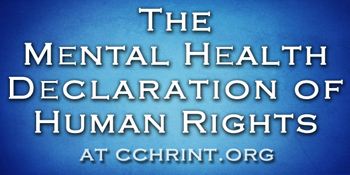By Kelly Patricia O’Meara
Published by CCHR International
The Mental Health Industry Watchdog
April 19, 2017
In recognition of World Health Day, the United Nations Special Rapporteur, Dr. Dainius Puras, acknowledged an important milestone by admitting there is no evidence to support psychotropic drugs as a first line form of treatment, and the longstanding problems arising from “excessive medicalization of mental health and the overuse of biomedical interventions, including in the treatment of depression and suicide prevention.”[1]
CCHR, the mental health industry Watchdog, applauds the Rapporteur’s admissions and believes his understanding of the problems that have been caused by medicalizing mental health issues is an important step in the right direction.
Dr. Puras was refreshingly straight forward about the widespread proliferation of psychiatric drugs stating, “The use of psychotropic medications as the first line treatment for depression and other conditions is, quite simply, unsupported by the evidence. The excessive use of medications and other biomedical interventions, based on a reductive neurobiological paradigm causes more harm than good, undermines the right to health, and must be abandoned.”
Interestingly, in no part of the Rapporteur’s statement is there a discussion about any known biological causes for depression or, for that matter, any other psychiatric disorder. Rather, Dr. Puras provides great detail about the human condition, explaining that, “The longstanding biomedical tradition of medicalizing various forms of psychosocial distress and human suffering has cast a long shadow over the importance of addressing the social and underlying determinants of health. This not only undermines the right to health, it also ignores a rapidly growing evidence base.”
What is the compelling evidence? Dr. Puras explains that depression, for example, is linked to a variety of behavioral issues, including childhood adversities, physical and emotional child abuse, inequalities and violence and other adverse conditions humans regularly encounter. Dr. Puras further makes clear that, “for a large proportion of people with mild and moderate depression, cost-effective specialized or non-specialized interventions based on human interaction and on talking and listening, starting from ‘watchful waiting,’ may be all that is required and must be understood as frontline treatment interventions.”
This should be good news to anyone familiar with the complete lack of science to support any psychiatric disorder and the abuses associated with mental health chemical treatments, and certainly is a step in the right direction for ensuring human rights.
Puras also pointed out how civil society is “increasingly using a human rights lens to scrutinize legal, policy, and service level responses to mental health.” As the world’s largest mental health industry watchdog organization, CCHR has long been advocating for increased scrutiny of mental health policies, and the abuses being committed under the guise of mental health. The Mental Health Declaration of Human Rights articulates the guiding principles and goals of Citizens Commission on Human Rights which include:
- The right to full-informed consent, including:
The scientific/medical test confirming any alleged diagnoses of psychiatric disorder and the right to refute any psychiatric diagnoses of mental “illness” that cannot be medically confirmed.
Full disclosure of all documented risks of any proposed drug or mental “treatment.”
The right to be informed of all available medical treatments which do not involve the administration of a psychiatric drug or treatment.
The right to refuse psychiatric drugs documented by international drug regulatory agencies to be harmful and potentially lethal.
The right to refuse to undergo electroshock or psycho-surgery.
- No person shall be forced to undergo any psychiatric or psychological treatment against his or her will.
- No man, woman or child may be denied his or her personal liberty by reason of mental illness, without a fair jury trial by laymen and with proper legal representation.
- No person shall be admitted to or held in a psychiatric institution, hospital or facility because of their political, religious or cultural or social beliefs and practices.
The need for global acceptance of the Mental Health Declaration of Human Rights is made clear when CCHR explains that, “virtually no human or civil rights are granted to those psychiatry deems mentally ill, that no medical or scientific tests exist to conclusively prove anyone is mentally ill, and that no guidelines exist to protect citizens from abuses committed under the guise of mental health.”
The data supporting the need for such a declaration is overwhelming:
- 183 million people are taking at least one psychiatric drug worldwide.
- 20 million children worldwide are taking psychiatric drugs.
- There are 386 international drug regulatory warnings and 429 studies from countries around the world documenting the harmful effects of psychiatric drugs.
- There are 38 drug regulatory agency warnings from eight countries and the European Union on antidepressants causing suicide, suicide risk or suicide attempts.
- There are 27 international drug regulatory warnings on psychiatric drugs citing effects of mania, hostility, violence and homicidal ideation.
- 64,000 people—one every forty seconds—are committed every month, against their will, to a psychiatric facility.
- An estimated one million people worldwide are subjected to ECT each year.
- Chinese and Russian authorities continue to forcibly commit political dissidents to psychiatric institutions—a practice that has been widely condemned by human rights groups and the United Nations.
Dr. Puras closes his statement by acknowledging past mistakes and explains that, “those who make policy decisions need to talk about what went wrong with addressing mental health of individuals and societies, and how things need to be different now.” CCHR applauds the Rapporteur’s efforts and would encourage him, as an additional step, to throw his support behind CCHR’s Declaration of Human Rights.
Kelly Patricia O’Meara is an award-winning former investigative reporter for the Washington Times’ Insight Magazine, penning dozens of articles exposing the fraud of psychiatric diagnosis and the dangers of the psychiatric drugs—including her ground-breaking 1999 cover story, “Guns & Doses,” exposing the link between psychiatric drugs and acts of senseless violence. She is also the author of the highly acclaimed book, Psyched Out: How Psychiatry Sells Mental Illness and Pushes Pills that Kill. Prior to working as an investigative journalist, O’Meara spent sixteen years on Capitol Hill as a congressional staffer to four Members of Congress. She holds a B.S. in Political Science from the University of Maryland.
References:
[1] Dainius Puras, “World Health Day: Power Imbalances and Inequalities Big Part of Poor Mental Health,” Health and Human Rights Journal, 6 Apr 2017, https://www.hhrjournal.org/2017/04/world-health-day-power-imbalances-and-inequalities-big-part-of-poor-mental-health/.




SHARE YOUR STORY/COMMENT